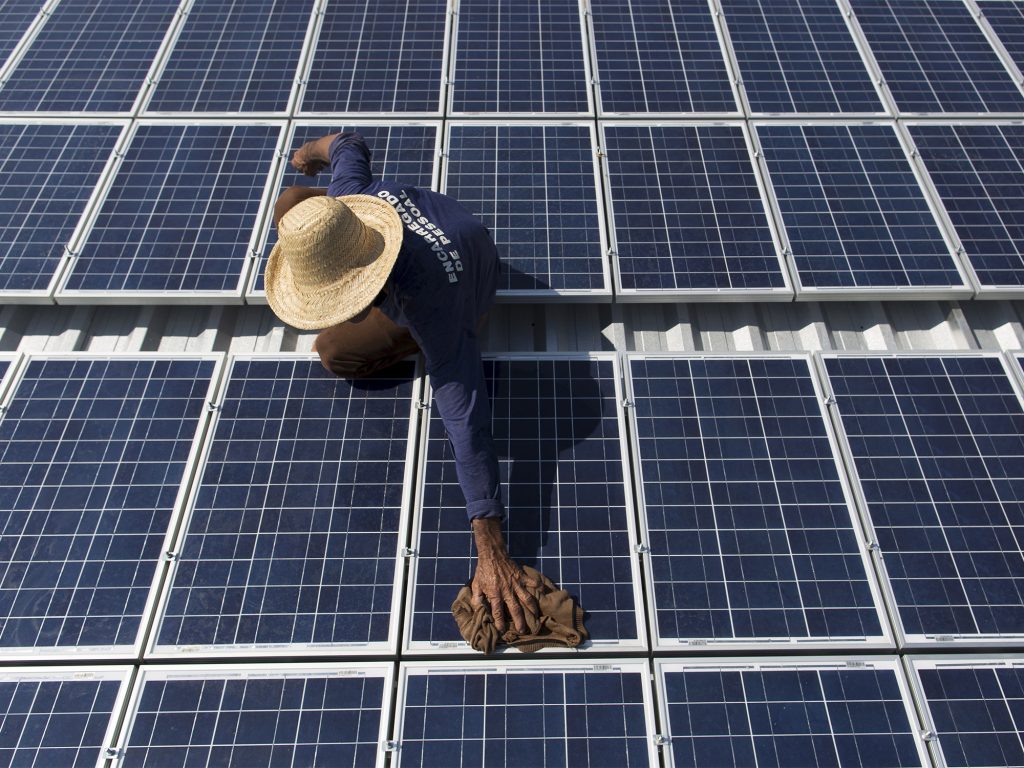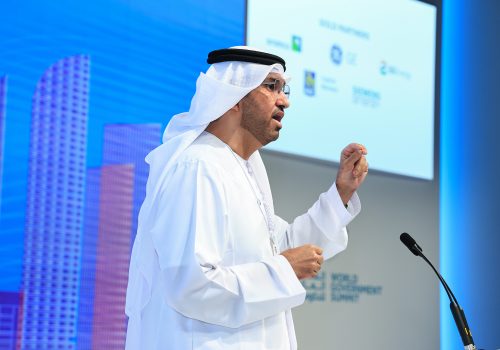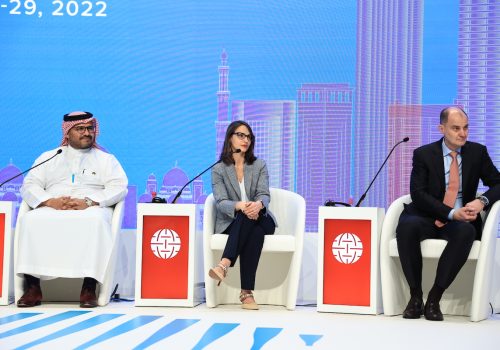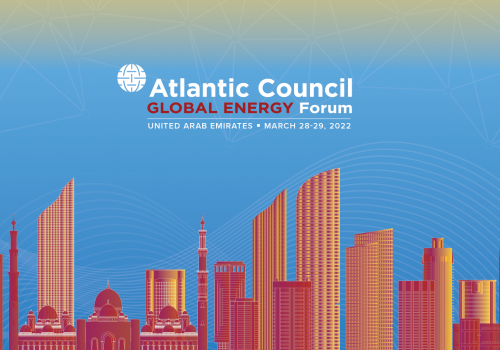Watch the full event
Event transcript
Uncorrected transcript: Check against delivery
Speakers
Chris Hulatt
Cofounder, Octopus Group
Gus Wiseman
Deputy Director, Investment Opportunities and Propositions, United Kingdom
Julie Chen
Chief Executive Officer, The Cheeky Panda
Ian Mackenzie
Chief Executive Officer, Trojan Energy
Ernst Van Orsouw
Chief Executive Officer, Roslin Technologies
Jo Parker-Swift
Chief Executive Officer, Solivus
Ben Turner
Chief Executive Officer, Origen Power Limited
Moderator
Eithne Treanor
Managing Director, E. Treanor Media
EITHNE TREANOR: Welcome back. Distinguished guests, ladies and gentlemen, I hope you had a lovely lunch. Welcome back. I know there’s lots to talk about. It’s great to be here, and it’s wonderful to have every one of you here with us.
We have an action-packed afternoon; in fact, a full day and a half left, great content to share with you, some great speakers. But before we do that and before we get back to, I suppose, the formalities and the panels of what we’re doing here with the Atlantic Council, we’ve brought you some of the great minds, the young minds in the world. We hear from many of the organizers, many of the CEOs, that everybody wants to work with, startups in the industry. They see tremendous disruption in the industry. And again, they welcome this disruption.
So what we’ve done is we’ve got together with the UK Department, actually, of International Trade. And they have the winners of the Green Builders of Tomorrow competition. So we’re going to share some views with them. They’re going to talk to you in terms of their great projects. These are all startup projects. They’re probably projects that you could all invest in as well, if you’re looking at that.
So I’m going to hand over now to the—to Gus Wiseman. And Gus is from the Department of International Trade. And, of course, Gus leads on the investment side from the UK. So let me hand it over to Gus.
GUS WISEMAN: Salam alaikum. Excellencies, ladies and gentlemen, it gives me great pleasure to introduce this session where the UK government, alongside our partner Octopus Group, have brought five companies illustrative of the opportunity and innovation within the UK to speak with you.
The UK is the fastest-growing G7 economy this year. We know that companies need three things to scale fast, and on each of these the momentum in the UK is clear.
First, they need capital. And in the UK, you’ll find a deals environment where deals are happening quicker and at bigger scale. And government reforms are going to make that capital market deeper and more agile still.
Second, they need talent. And UK universities are already amongst the best in the world, but what you’ll find is universities which are getting even better at spinning out and commercializing their intellectual property.
And third, you need an environment that’s fit for those companies. And we have strong clusters across the UK leveraging the industrial skills and heritage of different regions and parts of the UK and combining that with the capital that I’ve mentioned to launch the UK towards our net-zero future.
We have five companies with us today who see the world differently. Each of them has real breakthrough potential. They’re mature leaders and outstanding innovators in their field. So I’d invite you to hear their pitch and be part of the UK’s growth story.
First I’d like to introduce Chris Hulatt, the co-founder of the Octopus Group, to say a few words.
CHRIS HULATT: Thanks very much, Gus.
Good afternoon, everyone. Very good to see you and very good to be here in person today for this event.
There are two parts to the Octopus Group. The first part is a… vision we’ve been building for the past two decades that is active in renewable energy, in real estate, and in venture capital. The other part to our group is Octopus Energy, an energy-supply business we set up five, six years ago that today is active in around 13 countries around the world, with about 3 million customers.
We’re sponsoring this competition in collaboration with DIT because we really care about innovation and entrepreneurship. In the 22 years since we set up our business, we’ve seen that very directly ourselves. We’ve seen the power of starting a company, trying to tackle the big challenges facing the world. Our mission is very simple. We want to invest in the people and the ideas that will help change the world for the better.
Now, this Green Builder competition very much shines a light on companies that are playing their part in making a difference. They’ve got big ambitions and plans. They’re really exciting companies. It’s where sustainability, net zero and entrepreneurship comes together. And it’s great to be able to celebrate these fantastic companies with you today.
I think there’s also a very strong alignment between these companies and the ambitions of the UK government. There is that need to build a path towards renewables and to scale up the renewable sector as quickly as possible. There’s a new UK government strategic-energy plan on the way, out probably in the next few weeks, for which we think renewables has a really important part to play. The government has its 10-point plan about its own journey to net zero. And as you’ll hear, many of these companies have a role to play in achieving that.
At Octopus, we’re also looking very closely—looking forward to working very closely with the UAE in the months and years ahead. We think that’s a fantastic opportunity to partner with organizations here, particularly with COP28 on the horizon, a very exciting time for this part of the world.
But I think, with no further ado, I should hand over to the companies themselves so you can hear directly from them. And the first speaker is going to be Jo Parker-Swift from Solivus. Thank you.
JO PARKER-SWIFT: Hello, everybody. It’s really exciting to be here today. Thank you for the opportunity to speak with you, and particularly to the UK to partner in international trade.
I’m Jo Parker-Swift. I’m the CEO of Solivus. We are thin-film solar specialists, and we install thin-film solar on large commercial buildings. And it has low-embedded carbon. And we also create ground-mounted solutions using this thin-film technology, one of which you can see on the screen here today, our first product, our Solivus Arc, which generates more energy in a small area of ground space.
I wonder if you’ve ever seen large commercial buildings like this and wondered why they don’t have solar on the top. Well, many of these buildings, you know, in the UK cannot take the weight of conventional solar. If you put conventional solar on those, in many instances wind will take the roof off or the structure of the building won’t be able to take the weight of the solar. But these buildings are assets that can generate energy, megawatts of energy. And we’re putting thin-film solar on these buildings.
In the UK, a lot of people don’t wish to put solar on their roof because they don’t like the look of it. They can’t take it with them when they move. And we have problems getting scaffolding up to people’s homes and such like. So this is a ground-mount solution for the home in the UK. It’s got very low embedded carbon. It generates more energy in a small area of ground space and enables people to contribute to charging their cars and powering their homes.
So we have integrated solutions with companies that we collaborate with. It always starts with thin-film solar. So we have Cotswold Airport, which is the largest private airport in Europe, and we’re putting thin-film solar on the aircraft hangars there that can’t take the weight of conventional solar. This is going into an electrolyzer, which is an electrolyzer provided by Octopus Energy, and this creates hydrogen on site, green hydrogen on site, that’s going into an electric plane and decarbonizing flight—flying a plane with hydrogen. And we’re then talking about setting up similar things in other airports, creating flight paths.
We’re talking to housing developers about lots of our Solivus Arcs and our good-looking thin-film solar on roofs. And for large commercial buildings we’re helping people decarbonize their fleet.
This is a stadium where we’ve installed, and this is our vision to really contribute towards the energy transition by saving our clients money, enabling them to decarbonize their properties.
This is a very large market. In the UK there’s 2.5 billion square meters of south-facing roof, and only 5 percent of these currently have solar. So our market alone in the UK is about 5 [billion pounds] or 6 billion [pounds], and we intend to explore globally as well. In the Middle East, for example, our thin-film solar is particularly suited to hot climates, and it can cope with sand abrasion as well.
So the three things I mentioned, we decarbonize buildings, save people money. And you can see there’s a case study on here. So this is one building that’s so big you can fit seven megawatts on this building. It costs 8.5 million [pounds] to install the solar. But this customer would save 45 million pounds. We have a very large pipeline of opportunities through our clients. And this is really just because we’ve got a small number of clients that own a large number of properties.
So we’re looking for investment. We’ve already raised 5 million pounds, and we’re looking for 2.5—2.5 to 5 million [pounds] to expand our rapidly growing team. We need as many people as possible to meet demand and to invest in our product development.
Our plans are to have 10 million [pounds] revenue this year, 50 million [pounds] next year, and 100 million [pounds] the following year, where we will start to explore exit routes. Our team has grown enormously in the last year. And I’m really proud of them, and it’s an awesome team.
We have a number of products in the pipeline that we can develop going forward—products.
And for the last slide here, you can see these are examples of our installations. In the UK we have a number of historic buildings that you don’t want to spoil with solar. So there’s an installation on our historic building to keep it looking nice, a smooth roof where we just stick it on, adhere the thin-film solar to the roof, and here a sports stadium, where we have an IP for a backing sheet to put it on the stadium.
Thank you very much.
IAN MACKENZIE: Hi. My name is Ian Mackenzie. I’m founder and CEO of Trojan Energy.
And so around the world, about 30 percent of cars park curbside overnight and not in a drive. So that’s about 10 million cars in the UK, about 1 million here in the UAE, about 120 million in Europe and about 400 million worldwide. And the challenge is, how do we get these cars, as they move to electric vehicles, how do we charge them up without cluttering our streets with lots of ugly on-street charging posts?
And this is the solution that we’ve come up with. So essentially what we’ve designed is a charge point that gets embedded into the pavement that’s flat and flush with the pavement, allowing users to, whenever they want to charge, they have a charging lance, which you’ll see in a sec, which they can offer up to the charge point. It recognizes one of our lances, unlocks, allows them to insert. It locks in place. It plugs into their car. And it can charge up to 22 kilowatts and charge these vehicles quite fast.
And when they want to finish charging, they simply use their own car keys and unlock their own car, and that same signal we can use to take the lance out of the street. And it leaves the street completely clear of clutter, which is super important to actually keep our streets beautiful in all these cities.
So we’ve got a number of—well, I should say it’s about 50 percent of the price of traditional on-street charging, much faster. And it’s a scalable solution for cities to allow lots and lots of charging points to go into cities.
So we’ve got a number of technologies that complement it. We’ve got the Baywatch technology, which has sensors that look down on the street and send signals and push notifications out to EV owners to say there’s a charge space available for your car that you can come and get charged. And that way we can drive utilization up on the charge points.
And then, finally, for some streets that are not so busy, we have individual charge points that tie back into people’s homes so that they can get charged up and actually take advantage of those low-cost overnight tariffs.
So where are we as a business? Well, our team has been growing. We’re up to 18 people now. We’ll be 40 by the end of the year and continue to expand. We expect to be about a hundred by this time next year.
In terms of the market opportunity, we’ve been through—current deployments, we’ve putting about 175 charge points into London at the moment, and we’ll be about a thousand charge points by the end of the year.
We have world—we have the patent on flat-and-flush charging, and we’ve globalized this in several regions around the world. And we also have intellectual property on several other parts of our intellectual-property portfolio.
In terms of funding, at the moment we’re raising a convertible loan note around about 10 million [pounds]. And… next year, we look to raise about 25 million pounds.
In terms of our revenue growth, we’re looking—we’re going to do about 5 million [pounds] this year, and we’re looking to do about 40 million [pounds] next year and then growing on strongly from there. The opportunity is a massive opportunity in this space. And the on-street charging market is one of those last unsolved puzzles of the EV charging business.
OK. If you have any questions, I’ll be around afterwards and I’ll be happy to take them. Thank you very much.
JULIE CHEN: Hello, everyone. Hello, everyone. My name is Julie, co-founder and CEO of the Cheeky Panda. We are a tissue and hygiene-products disrupter.
The business was co-founded by my partner Chris and myself with our baby Leo in mind. We want Leo to grow up in an eco-friendly world using natural products that’s kind to his skin as well as the environment. We are multi-award winning. We have won over 20 awards. Products are sold in over 25 markets.
Climate change is a big issue facing our climate at the moment. CO2 is the largest contributor to global warming. Trees are being cut down for things like toilet paper, causing deforestation. Our water and riverways are increasingly polluted by plastic.
Our solution is bamboo, simply because it’s the world’s fastest-growing plant. It grows 30 times faster than trees. It absorbs 35 percent more carbon and releases 30 percent more oxygen. It’s a grass. When it’s harvested, it grows back from its own root, requiring no fertilization or replantation.
Our products include toilet paper, facial tissue, kitchen rolls. We also have baby wipes, baby nappy, as well as facial cleansing wipes and antibacterial wipes. We also offer toilet jumbo rolls to businesses and bamboo paper straws to restaurants, to those businesses who are looking for low-carbon, high-quality, sustainable solutions.
Our products are ultra-sustainable, carbon-balanced, and plastic-free. We use 100 percent of certified bamboo. One ton of Cheeky Panda toilet paper can remove 20 tons of carbon from atmosphere. One ton of Cheeky Panda toilet roll saves 240 trees and 11—32 kilograms of plastic.
Our products are FSC-, vegan-, and cruelty-certified. We are a certified B Corporation as well as certified ethnic-minority business. We work with charity the World Land Trust and all products are dermatologically tested by SGS.
In just under six years, we have gained retail listings worldwide. We work with premium retails… Today, we have saved 8,000 kilograms of plastic, we have removed 18,000 tons of carbon from the atmosphere, and we have saved 230,000 trees. Our goal is to save 1.1 million trees by 2025. Our vision is to build the Cheeky Panda brand to be a signpost for 21st century sustainability. These are some examples of our products we sell in supermarkets worldwide, such as Carrefour in China, Whole Foods Market in Australia, Whole Foods Market in London, and Boots in London. You can also buy our products in the UAE market, as well…
Thank you very much. We are looking for potential business or retail clients, as well as potential investors. Thank you very much.
ERNST VAN ORSOUW: We are at the forefront of one of the most consequential changes in our food system. Cultivated meat is meat grown directly from cells and bioreactors without the need to raise animals. The promise is going to be massive. We can eradicate animal-welfare issues, we can improve human health, and we can reduce the environmental footprint of food production.
More importantly for the Middle East, the Middle East can not only become a meat producer for themselves. They can actually have the opportunity to become a meat exporter for the world, with low-cost energy.
At Roslin Technologies, we deliver the foundational ingredient for this sector. And my name is Ernst Van Orsouw, and I’m leading Roslin Technologies.
Cultivated meat was invented in 2013 in the Netherlands, where the first doctor made a hamburger grown from cells in a Petri dish. That cost $300,000. Fast-forward to 2022. There’s now 150 companies focused on this. More than $3 billion have been put into this business, and large producers in meat are stepping into the sector.
To make cultivated meat viable, it needs to be safe, nutritious, and affordable. And to achieve that, the costs need to come down and billions of dollars of capital are needed. Making cultivated meat requires four capabilities. You start with the cells. You add media, which is the nutritional solution to help the cells grow. You add a scaffold for texture. And you put it all in a bioreactor and you feed it with low-cost energy.
Cells are the starting material for this process, and they impact each step of the production process and impact in total 70 percent of the cost base. The cells that you need need to grow fast, efficiently, and need to deliver great meat. And that’s where we at Roslin Technologies come in.
Roslin Technologies is a biotech company backed by the University of Edinburgh in Scotland. We are based at Roslin Institute that was primarily famous from the invention of Dolly the sheep back in 2006—1996. She was the first mammal that was cloned from an animal cell, and this was a major scientific breakthrough.
Today we are once again at the forefront of stem-cell innovation. We can produce cells that form the foundation of sausages in the United States, chicken nuggets in Europe, and lamb kabobs in the Middle East. All this meat will be made without slaughtering animals and with a positive impact on the environment.
So what do we do at Roslin Technologies? We focus on pluripotent stem cells. We can take cells from an animal. We can reprogram those cells to become pluripotent stem cells, which means they self-renew forever and can differentiate into any tissue, including muscle and fat. Each cell can produce millions of tons of meat.
And let me illustrate that. Our cells, they double every 24 hours. If I started one cell on day one, I have two on day two. I have four on day three. After 42 days, I have enough cells to fill a bottle. And after 63 days, I have enough cells to fill an Olympic-size swimming pool. Wait one more day, and I have two swimming pools.
We make our cells available to producers globally, whether they are large or small, beef or chicken or lamb, whether they’re in rich nations or developing nations. We want to empower cultivated meat producers to make the most sustainable meat, whether it’s dumplings in Asia, the chicken nuggets that we made in our lab in Roslin Technologies, or the sausage that happens to not be on the slide.
As a company, we’re the first ones to provide cells to this industry. We create the cells. We create the market, and we will lead the market. We ship our cells in vials this size across the globe, and that comes with instructions on how to grow them and make meat. We started to commercialize last year, and today we ship our cells across the United Kingdom, the European Union, the Americas, and Asia.
And I want to go to the Middle East as well, because I believe that the Middle East can be a leader in this space. Not only is it a strategic fit for this region to become more food-independent. I also believe that with your local energy, whether it’s fossil fuel today or renewable in the future, you actually have a massive cost advantage over the rest of the world.
We are on an incredible journey. We have made great progress today and have ambitious plans. We invite you to be part of the journey, because with better cells we can have cultivated meat reach consumer masses faster, improve the sustainability of the food system, and capture that here, right here in the Middle East and in the United Arabic Emirates.
Thank you.
BEN TURNER: Hi. Good afternoon, everybody. My name is Ben Turner. I’m the CEO of Origen.
And at Origen, we’re decarbonizing an industry that very few people know about but contributes a huge amount of carbon dioxide to the global problem, and that is the lime industry. That industry alone is responsible for 400 million tons of carbon-dioxide emissions, 1 percent of the global total. And the beauty of lime is it can actually be repurposed for the purposes of carbon-dioxide removal.
So why do we need to remove carbon dioxide from the air? It’s not enough to stop the 40 billion tons of carbon dioxide we put into the air each year globally. We actually need to remove the carbon dioxide that is already in the air. The problem with that process, however, is it’s very expensive today. And I believe, we believe at Origen, that lime is a perfect material for doing so. It is cheap, it is robust, and it is scalable.
But the problem with lime today is that for every ton of lime produced, a ton of carbon dioxide is emitted into the atmosphere. And that rather renders the use of conventionally produced lime completely ineffective for CO2 removal. So we need a process to make lime with zero carbon emissions, a process that we call zero-carbon lime.
And this is what we’re doing. So we’re not just talking about it. We are actually building it. The picture on the left is our pilot plant in the Humber region in the UK. It’ll be the world’s first zero-carbon lime to be produced. In about eight weeks’ time—it’s actually the culmination of nine years’ worth of work—we’ll be producing that zero-carbon lime.
And why is that important? Well, it’s important for three real reasons. First up, it makes this industry zero carbon, avoiding those 400 million tons of emissions. Secondly, this is scalable, ready for deployment now. And actually, and most importantly, this opens up a huge range of opportunities in climate-related applications. I’m talking direct air capture, removing CO2 from the air. I’m talking about cements, sustainable building materials. I’m talking about point-source capture, capturing CO2 from the emissions of chemical industry, oil and gas, various other industries. I’m also talking about ocean liming, which, if there’s any questions about, afterwards we can talk about.
But from a commercial perspective, we’re focused on decarbonizing a sector, the lime industry, and leveraging that capability to deploy into those markets. The size of this opportunity is humongous. And if I can get the slide—there we go. So the lime industry alone is a $6 ½ billion revenue opportunity. That’s what we’re going after today. But carbon dioxide removal itself is gigantic. We need to remove a trillion tons of CO2 from the air. This is the next trillion-dollar industry.
From a team perspective, we have got some of the best minds working on this. We have experts in combustion technology, lime-kiln technology, CO2-removal technology. We have oil-and-gas veterans who are experts in carbon-dioxide storage. And we have deployment experts, like our CTO, who’ve worked in industries like nuclear, deploying this at billion-dollar scale.
Why is this relevant to this region, the UAE in particular? First off, CO2 removal is a necessary must to achieve net zero. Secondly, the resources to make this work are abundant in the UAE, Saudi Arabia, the Middle East generally. They are natural gas, limestone, and carbon-dioxide storage. Sorry.
And the final point here is financial opportunity is massive. It’s not just about decarbonizing a relatively small industry today. It’s about solving the problem of climate change and the climate issues of CO2. The opportunity is humongous. And why is this important now? So we just raised about $10 million, but we’re looking to raise about 25 [million dollars] to $50 million later this year to take our technology to the next scale. We’ve got a really important earl-mover advantage here. We’re working with an industry already. We’re partnering with that industry. We know how to store carbon dioxide. That provides us with a clear route to revenue. And as I mentioned previously, the use of lime in climate-related applications is a huge opportunity.
Thank you very much for your time; much appreciated. I don’t know what’s our plan now. OK. Well, thank you very much.
EITHNE TREANOR: Thank you all so much, and I wish you the very, very best of luck. We have some great minds. There are some great projects. So well done to you all. And, of course, thank you so much. You heard from all of them there in terms of the great work that they’re doing, the projects they have put in place. And so often the energy industry is looking for interesting startups to back, to get behind. If there’s spare cash in the bank, these are the type of people that are looking for them as they actually put new, different, and sustainable projects together. Ultimately, that is all of the great work they’re doing.
Watch the full event
Further reading
Mon, Mar 28, 2022
To prepare for the energy transition, policies must serve ‘real-world scenarios,’ says top UAE official
Global Energy Forum By
In all the world's challenges—the ongoing pandemic, inflation, and, most recently, the Russian invasion of Ukraine—energy plays a central role.
Mon, Mar 28, 2022
How will today’s energy crisis impact the global energy transition?
Global Energy Forum By
The move to clean energy is crucial, but solving today's energy crises will be also key.
Mon, Mar 28, 2022
Meet the global leaders powering the world’s energy transition
Global Energy Forum By
The return of pre-pandemic energy consumption, threats of cyberattacks on critical infrastructure, crises across Europe, and more have dampened hopes for a swift energy transition. But global energy leaders are no less determined.
Image: Francisco da Silva Vale, 61, cleans solar panels which power ice machines at Vila Nova do Amana community in the Sustainable Development Reserve, in Amazonas state, Brazil, September 22, 2015. Three solar-powered machines, are producing about ninety kilos of ice per day, in a region with poor access to electric energy, which used to be produced only with diesel oil, in the Amazon rain forest. The Gelo Solar (Solar Ice) project, developed by the Mamiraua Institute for Sustainable Development and the Sao Paulo University (USP), aims to improve the life quality of the residents of the communities allowing them to preserve their fish and fruits productions which are their main economic resources. The Mamiraua Institute is also using solar energy to supply the community's homes with water and light up a soccer field. Picture taken September 22. REUTERS/Bruno Kelly




